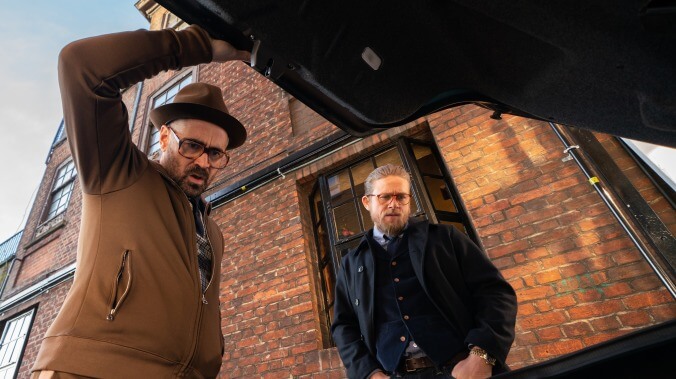Guy Ritchie stumbles through his greatest hits in the nostalgic crime caper The Gentlemen

Guy Ritchie has spent the last decade translating his kinetic visual style and macho cool to big-budget revivals of intellectual property. He molded Arthur Conan Doyle’s trademark sleuth into a rakish brawler and brought a ’60s TV spy drama to the big screen with the help of top-notch costume design and good old-fashioned screen chemistry. Yet his journeyman work hasn’t been a complete success. His live-action take on Disney’s Aladdin invited some of the most indifferent reviews of his career, even as it grossed a billion dollars. Meanwhile, his spin on King Arthur suffered a worse fate; it was so poorly received that Warner Bros.’ planned “Arthurian cinematic universe” was DOA.
These films are a far cry from the unabashedly British crime pictures of the director’s early years. Loaded with high energy, snappy one-liners, and self-consciously cool violence, Lock, Stock And Two Smoking Barrels and Snatch rode a post-Tarantino, post-Trainspotting wave that secured Ritchie cult appeal in the States. Ritchie returns to that mode after a profitable sojourn in Hollywood with his latest, The Gentlemen (originally titled Toff Guys and then Bush, both equally bland choices), but with much less polish and vigor. Too often, The Gentlemen creaks through the motions of Ritchie’s patented vision, absent the spark necessary to bring his fast-paced action and profane zingers to life. It’s like watching a reunited band struggle to recapture the energy of its glory days.
Beyond a couple of diverting chases and a perfunctory shootout or two, there’s a surprising lack of mayhem in The Gentlemen. Instead, Ritchie leans heavily on florid writing, providing almost every member of his character-actor ensemble a meaty meal of dialogue. The needlessly complicated plot follows pot baron Mickey Pearson (Matthew McConaughey) as he faces off against Chinese gangsters, amateur boxers, and the tabloid press while in the process of selling his empire. Ritchie frames the film as a based-on-a-true-story screenplay pitch from the flamboyant private investigator Fletcher (Hugh Grant), who tries to blackmail Pearson via his righthand man Raymond (Charlie Hunnam, who starred in Ritchie’s aforementioned King Arthur movie) with evidence of his illegal dealings. Despite all the superficially criminal machinations, The Gentlemen amounts to little more than a series of tense confrontations, with one man trying to verbally outwit or intimidate another. Occasionally Ritchie switches it up by adding more men in the room.
It’s not always as boring as that sounds. The Gentlemen doesn’t sport a great hit-to-miss joke ratio, but Ritchie can find his way into a funny line or engaging banter. When the film settles into a groove—which takes an unreasonably long time because of its protracted set-up—it can be fun to watch an actor find their own spin on Ritchie’s ornate vulgarities or rough-and-tumble monologues. In fact, The Gentlemen essentially lives and dies on the strength of its performances, which often vary on a scene-by-scene basis and run the gamut from fatigued to engaged.
Take Hunnam, for example. He mostly adopts a sinister calm, but comes to life when belittling a group of posh heroin-addled teenagers while on a rescue mission to save a minor Royal’s daughter. Unfortunately, Ritchie mostly relegates the actor to scenes opposite Grant, where he’s required to do little more than react to the veteran Brit’s garrulous ramblings. Still, Grant fares well: His character might skirt the line of gay stereotypes (he frequently speaks to Hunnam in eye-rolling homoerotic come-ons and double entendres), but he enlivens his scenes with goofy, larger-than-life zeal. On that note, it’s a shame that Colin Farrell—who can mine laughs on sheer delivery alone, especially when he’s allowed to crack wise in his own accent—only has a two-bit role as a boxing coach whose grime-rapping students get mixed up in Pearson’s business. Meanwhile, McConaughey has rarely seemed more bored; he sleepwalks through menacing speeches and threatening gestures, barely mustering up the energy to yell when needed.
Any good work on the performance level is inevitably stymied by The Gentlemen’s overstuffed script, which shortchanges everything from key character relationships to plot payoffs, even as it luxuriates in a bloated runtime. Much worse is the bewildering strain of anti-Chinese racism. It might be possible to chock up the many epithets lobbed in the direction of Chinese underboss Dry Eye (Henry Golding) to the racial insensitivity of the characters (though it doesn’t help that the slurs are all played for laughs). But it’s difficult to overlook how Ritchie actively positions the Chinese characters as more societally destructive than their white counterparts. Everyone might be in the drug trade, but the film’s East Asian gang hocks heroin that ravages the country’s poor youth, while the well-dressed white businessmen peddle harmless weed that doesn’t kill anybody. Ritchie doesn’t keep this moral contrast implicit; he has McConaughey condescendingly explain it to the gang’s leader in a lengthy monologue, leading the audience to delineate between heroic and villainous drug dealers. And guess which character is revealed to be a would-be rapist? Hint: It’s not one of the white gangsters.
For better or worse, Ritchie has an identifiable style—rapid-fire, MTV-adjacent editing; trance-like character montages; characterization by way of cockney bluster—that can be entertaining when carefully calibrated. Here, it’s too inconsistent to make a good impression. In many ways, The Gentlemen operates like one of the Hollywood nostalgia trips upon which Ritchie embarked this past decade, only this time the director is tunneling back in time to relive his own creative past. (There’s even a cheeky sight gag involving Miramax, the film’s production company, key evidence of Ritchie’s stuck-in-the-mid-’00s frame of reference.) Sometimes you catch glimpses of that old passion, albeit in new, more expensive packaging. But in the end, The Gentlemen mostly just reminds you of how long it’s been since the original article.